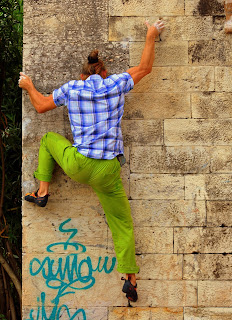 |
| image of someone climbing a wall from Pixabay |
Sometimes I end up spending more time on Facebook than I intend to, and often it leaves me feeling yuckier than before I started. BUT. Sometimes I find an article that sort of rocks my world, and today I found one that really gave me pause. Sparrow Jones posted in The Thinking Person’s Guide to Autism blog, an article titled Autism and the Burden of Social Reciprocity.
The author wove her own personal experiences of social isolation and connection as someone with autism with information from a meta-study conducted recently that analyzed the differences in the first impressions people have of autistic and non-autistic people, and the role this plays in inclusion. She makes a brilliant point that it is not only people with autism and their difficulty with social skills that are causing the isolation. It is also neurotypical people who do not have the social skills to adapt to include people who present differently.
In her words, “Autistic people can’t take all the blame for underdeveloped social skills because non-autistic people actually are actively avoiding us, limiting our access to opportunities to practice being social in real-world situations. The study authors found that …our ability to socialize is limited every bit as much by social ostracization from others as it is by our own neurology and the challenges to socialization it can present for us.”
I’ve been thinking a lot about inclusion lately, and what it means to make my own life, my communities, and the libraries I work with more inclusive. This article was a perfect example of what that looks like. How can I work against my first-impressions to be inclusive and welcoming to people, no matter how they present themselves socially? I am reminded something my daughter Alice told me recently that really rocked my world: “People who have a lot of social skills sometimes seem like they are nicer than people who are more socially awkward. But they aren’t. They just seem that way because they know how to make people comfortable.” I never really thought about how I tend to assume the opposite, but thank goodness for people like Sparrow and Alice, keeping me on my toes.
